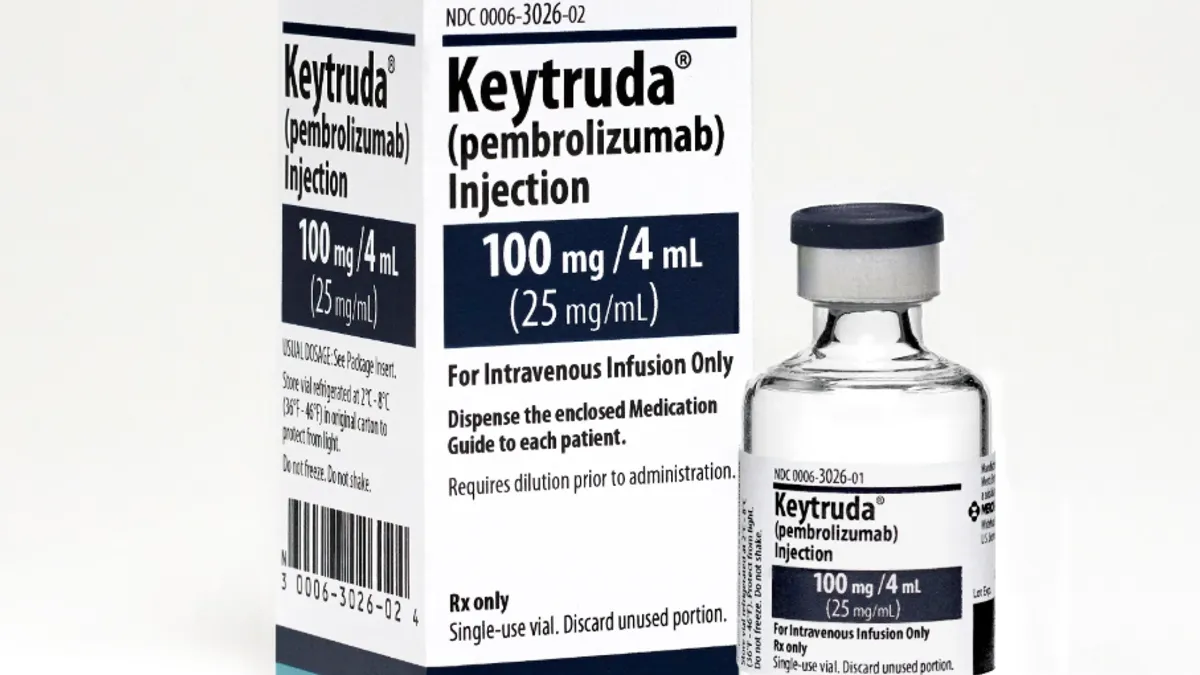Blood Test Uses Machine Learning to Detect Multiple Early-Stage Cancers
Trend Watch: Digital therapeutics, chips, patches, and machine learning enable better health outcomes.
Johns Hopkins Kimmel Cancer Center researchers developed a single blood test — CancerSEEK, a unique noninvasive, multi-analyte test — that simultaneously evaluates levels of eight cancer proteins and the presence of  cancer gene mutations from circulating DNA in the blood. The test screens for eight common cancer types that account for more than 60% of cancer deaths in the United States. Five of the cancers covered by the test currently have no screening test.
cancer gene mutations from circulating DNA in the blood. The test screens for eight common cancer types that account for more than 60% of cancer deaths in the United States. Five of the cancers covered by the test currently have no screening test.
Investigators initially explored several hundred genes and 40 protein markers, whittling the number down to segments of 16 genes and eight proteins. They point out that this molecular test is solely aimed at cancer screening and, therefore, is different from other molecular tests, which rely on analyzing large numbers of cancer-driving genes to identify therapeutically actionable targets.
In this study, the test had greater than 99% specificity for cancer. The test was used on 812 healthy controls and produced only seven false-positive results.
The test was evaluated on 1,005 patients with nonmetastatic, stages I to III cancers of the ovary, liver, stomach, pancreas, esophagus, colorectum, lung, and breast. The median overall sensitivity, or the ability to find cancer, was 70% and ranged from a high of 98% for ovarian cancer to a low of 33% for breast cancer. For the five cancers — ovarian, liver, stomach, pancreatic, and esophageal — that have no screening tests sensitivity ranged from 69% to 98%.
To zero in on the analytes they included in their CancerSEEK test, the research team pulled data from more than three decades of cancer genetics research generated at the Ludwig Center at Johns Hopkins, where the first genetic blueprints for cancer were created, as well as data from many other institutions.
The investigators believe that a test that can be used routinely for cancer screening must have a cost in line with or less than other currently available screening tests for single cancers, such as a colonoscopy. They envision that the CancerSEEK test will eventually cost less than $500.
Teen Develops Recognition App for Alzheimer’s Patients
After watching her grandmother struggle to remember her own family members, young coder Emma Yang, then only 12, decided to figure out how to use artificial intelligence and facial recognition to help her grandmother and others coping with the illness. Ms. Yang is now 14.
The first of its kind app, Timeless, is a simple, caregiver-assisted, easy-to-use mobile app for Alzheimer’s and dementia patients aimed to help them remember events, stay connected and engaged with friends and family, and recognize loved ones using artificial intelligence-based facial recognition technology. Alzheimer’s patients can scroll through photos of friends and family, and the app will tell them who the person is and how they’re related using facial recognition technology. If a patient doesn’t recognize someone in the same room, they can take a picture and the technology will also try to automatically identify them.
Crowd funding is being done through Indiegogo, and Ms. Yang is working with mentors and has partnered with the facial recognition company Kairos. She hopes to move Timeless to a pilot phase soon.
Blood-Vessel-On-a-Chip Helps Identify Safer Clot Prevention Drug
 The functionality of many drug candidates can be extremely difficult to study, particularly when dynamic processes on a scale larger than a drug’s molecule, such as blood flow, are involved.
The functionality of many drug candidates can be extremely difficult to study, particularly when dynamic processes on a scale larger than a drug’s molecule, such as blood flow, are involved.
A research team recently used a blood-vessel-on-a-chip, a device developed at Harvard’s Wyss Institute, to identify a set of synthetic molecules that has impressive abilities to prevent clot formation while keeping the levels of thrombin, the body’s most important coagulant, at safe levels. This work was enabled by leveraging the Wyss Institute’s Organ-on-a-Chip technology to model thrombosis within a human blood vessel in vitro. The discovery is described in the latest issue of the Proceedings of the National Academy of Sciences.
The new compounds are based on activated protein C (APC), an anti-coagulant naturally produced by the body that is also an anti-inflammatory compound. While APC does a good job, too much of it prevents the functionality of thrombin and, therefore, increases the potential for bleeding. The researchers identified so-called parmodulins as having positive anti-inflammatory and antithrombotic abilities thanks to their promotion of cytoprotective chemical signals and blockage of destructive signals.
“We essentially performed a mini preclinical trial of parmodulins’ effect on the endothelium, and not only determined the pathway through which parmodulins function, but also demonstrated that they help protect endothelial cells from inflammatory damage," says study researcher and former Wyss postdoc Abhishek Jain, Ph.D., who is currently at Texas A&M University.
Magellan Health Launches Digital Therapeutics Pilot for Patients with Substance Use Disorder
As a pioneer in the use of digital therapeutics and computerized cognitive behavioral therapy, Magellan has engaged in a new initiative designed to measure clinical outcomes in patients with substance use disorder by leveraging reSET, the first-ever FDA cleared prescription digital therapeutic from Pear Therapeutics. This product combines patient-facing interventions and assessments via a mobile device, with clinician-facing dashboards and data analytics on the back-end. reSET has been shown in clinical studies to increase abstinence from a patient’s substances of abuse during treatment and increase patient retention in the outpatient treatment program.
The pilot program will enroll 250 patients with SUD and offer each patient a 12-week course of reSET therapy. The collaboration aims to examine patient abstinence and program retention through increased engagement and therapy adherence. The pilot will use advanced data analytics generated through the reSET therapy and accompanying clinician dashboards to more effectively provide technical support and clinical outreach to both treatment providers and their patients.
Magellan believes this pilot will help support the broader strategy to engage consumers in ways that match the best of new and traditional methods to drive optimal outcomes. This pilot is important to help understand the value that FDA-approved digital solutions bring to the healthcare market, as well as the operational requirements needed to support digital therapeutics.
Editor’s Note: See the February Issue’s Digital Therapeutics for more information about Pear Therapeutics and reSET.
Novel Microneedle Drug Delivery Patch for Burning Fat
 Obesity results from excess white fat storage, which makes it difficult to treat because the effectiveness of diet, exercise, and systemic anti-obesity agents is limited, and in the latter case may cause serious side effects. As a result, researchers are investigating innovative strategies for localized delivery of fat-burning compounds via transdermal patches. Medgadget recently reported on a novel microneedle patch, which contains a nanoparticle-encapsulated drug that converts white fat into brown fat. Whereas stored white fat acts as a long-term energy reserve, brown adipose tissue burns easily.
Obesity results from excess white fat storage, which makes it difficult to treat because the effectiveness of diet, exercise, and systemic anti-obesity agents is limited, and in the latter case may cause serious side effects. As a result, researchers are investigating innovative strategies for localized delivery of fat-burning compounds via transdermal patches. Medgadget recently reported on a novel microneedle patch, which contains a nanoparticle-encapsulated drug that converts white fat into brown fat. Whereas stored white fat acts as a long-term energy reserve, brown adipose tissue burns easily.
Another more recent study describes the use of a transdermal microneedle patch to deliver a “fat-browning" drug (Beta-3 adrenergic receptor agonist or thyroid hormone T3 triiodothyronine) locally via detachable, dissolvable polymer microneedles. The device, created by researchers at Nanyang Technological University in Singapore, is activated by pressing the patch to the skin for a couple of minutes, which causes the microneedles to detach from the patch. As the microneedles degrade, the drug is released into surrounding subcutaneous white fat, resulting in localized conversion of white adipose tissue into energy-burning brown fat.
This was tried in a diet-induced obese mouse model. Treated mice showed less weight gain, a 30% reduction in fat mass over a four-week time span, and a reduction in blood cholesterol and fatty acid levels.
This study corroborates previous research and provides promising proof-of-principle.
Apple Brings Seamless Health Records to iPhone
Apple has made a significant update to its health app with the release of iOS 11.3 beta, which includes a new feature for customers to see their medical records on their iPhone. The updated health records section within the Health app brings together hospitals, clinics, and the existing health app to make it easy for consumers to see their available medical data from multiple providers. Johns Hopkins Medicine, Cedars-Sinai, Penn Medicine, and other participating hospitals and clinics are among the first to make this beta feature available to their patients.
In the past, patients’ medical records were held in multiple locations, requiring patients to log into each care provider’s website. Apple worked with the healthcare community to take a consumer-friendly approach, creating Health Records based on FHIR (Fast Healthcare Interoperability Resources), a standard for transferring electronic medical records.
Now, consumers will have medical information from various institutions organized into one view covering allergies, conditions, immunizations, lab results, medications, procedures, and vitals, and will receive notifications when their data are updated. Health Records data are encrypted and protected with the user’s iPhone passcode.(PV)


















